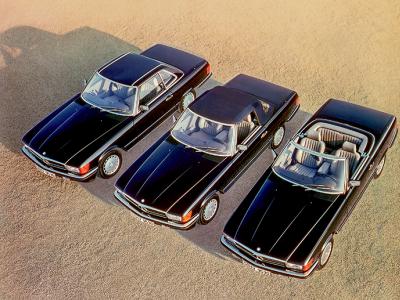
ABOVE: Have it your way – the R107 SL could be enjoyed as a coupe, a convertible or a roadster.
Buyers Guide – R107 Chassis – 1972-1989
Taking a closer look at the refined grand-touring models – the 350SL, 450SL, 560SL, 450SLC, and 380SLC – built on the R107 Chassis, 1972-1989
Article by Richard Simonds
The Mercedes-Benz SL roadster series built on the R107 chassis followed the heritage of the 300SLs, 190SLs and 230/250/280SLs. They were designed in the tradition of European grand touring cars, more boulevard cruisers than sports cars because of their comfort and elegance. The R107s were rarely used on racetracks because they were not competitive with the lighter-weight two-seat sports cars of their day. Instead, they were designed for a different audience and are now considered the most affordable of the classic SLs for those who prefer an open-top car with the comfort, elegance and cache of a Mercedes-Benz.
The SLC variants built from 1972 through 1981 were extended-wheelbase models designed specifically for long-distance rally competition; to qualify under homologation rules, the cars were also offered to customers. They had room for four passengers and offered a sunroof for buyers who wanted a bit of open-air travel.
For those who monitor trends, the 300SLs (Coupes, Gullwings and Roadsters) have long since reached serious collectible status with prices starting at more than $1 million. Even the 190SLs are bringing their owners $150,000 for prime examples. The whole W113 series (230SLs, 250SLs and 280SLs) have begun a steep increase in prices during the past few years, with top-quality cars selling in the $90,000 to $127,000 range. For the enthusiast who wants a Mercedes-Benz sports car or grand touring car, the R107s are now at the point where they are still affordable, but on the cusp of starting to appreciate in value.

Powerful slim-bumper European 500SL, 1980s.
Characteristics of the model series
The R107 has been affectionately known as “The Panzerwagen” because of its tank-like build quality. It is also a model that was sold for 18 years with only minor modifications to the chassis to meet legislative requirements and featured different engines and transmissions to meet both market needs and legislative mandates. So although enthusiasts have their preferences for certain years of the R107s, the fact is they shared the same basic chassis and body style for their entire production life. This means that there is a huge number from which to choose when you decide to get your own Panzerwagen.
Another feature of the R107 SLs is that they could be configured with a hard top as a coupe as well as a soft top to enjoy open-air travel, a trait from the 300SL Roadsters and the W113 series. The Mercedes-Benz Classic Center even assigned the R107s a classic status before the earliest models were 25 years old because of their long production run. What this means to R107 buyers is that they have support for parts and service from the Classic Center located in Irvine, California, as well as from a variety of independent product sources.

All R107 SL/SLCs were endowed with an elegant and sturdy interior.
Reasons to buy an R107
• Refinement, reliability and comfort with a sporty panache
• Styling that is timeless and classic
• Exceptionally durable engines – when well maintained
• Automatic transmissions are very reliable – when they are well maintained
• Acceleration adequate for contemporary driving in the city or on cross-country tours
• Brakes that are consistent and inspire confidence
• Safety features well ahead of their time
• Service available from M-B dealers and independents
• Parts availability from many sources, including Mercedes-Benz Classic Center USA
Reasons not to buy an R107
• Suspension vulnerable to rust, sub-frame assemblies may need replacement, bushings wear and may need replacement
• Automatic climate control (1977-1981) that can require replacement parts
• Air-conditioning in the early years that is barely adequate in hot climates
• Timing chain on 380SL/SLC engine that requires regular service or replacement with double-row chain
• Aluminum engines (heads, blocks) can suffer corrosion from poor quality antifreeze or lack of regular servicing
• Low fuel efficiency on V-8 engine models, even for the era

American market 380SL Roadster with larger federally mandated crash-impact bumpers, 1982.
Checkpoints
• The front sub-frame was prone to cracking and should have been replaced under recall; have professionally inspected
• Body rust can occur in frame rails, front fenders (due to poor drainage), in HVAC blower box, and battery housing in trunk
• Valve-train issues: Timing chains, tensioners, and cam lobes should be inspected for wear and regular maintenance and/or replacement
• Cooling systems, especially on 1974-1977 450SLs, can contribute to over-heating due to catalytic converter location
• Automatic Climate Control (ACC) systems (1977-1981 models) – especially control valves behind dash console – must be checked to ensure system will provide cold air when needed
• Water damage to the interior is common and can cause rust in floor pans, ruin carpets, and be expensive to repair; the cars weren’t as watertight as they should have been
• Aluminum-engine cars prone to head gasket oil leakage
• Aluminum oil pans may be severely damaged or cracked after hitting parking curbs or major potholes
• Airbags that were installed beginning with 560SLs need to be replaced every 10 years
• D-Jetronic Fuel Injection systems can be damaged by technicians who service the systems without adequate knowledge – be sure the system works as it should

Grace and pace – 450SL Coupe embodied personal luxury and sporty freedom of the Mercedes-Benz R107
Buying tips
• Buy the cleanest, best-maintained, most complete R107 you can find; restoration costs exceed current and anticipated market values of best-condition cars
• Looks can deceive and conceal problems created by poor maintenance; they can be very expensive to fix after purchase
• Get service records from new if at all possible. A formal inspection by a knowledgeable mechanic is well worth the money to avoid expensive problems
• If your state has emissions system and/or safety inspections, make sure the car meets those requirements before purchase
• Personally drive the car if possible; if not, have a knowledgeable friend or mechanic drive it to evaluate operating condition – not just how beautiful it looks

For many, the beautifully styled and solidly built Mercedes-Benz SL symbolized youthful luxury and success in the 1970s and 1980s.
The bottom line
The R107 series is a great entry point to classic Mercedes-Benz ownership, especially for the person looking for a fun weekend driver and recreational touring car. With more than 200,000 examples produced over an 18-year production run, likely candidates for purchase should be readily available. That said, quality varies from excellent, carefully maintained vehicles to cars with needs that far exceed potential enjoyment and resale value. However, longterm value, attractive styling and comfortable ride will reward the careful buyer for many years to come.


450SLC, 1972-1981. An SLC seen in profile shows the longer wheelbase of the range.
The SLC Models: 1972-1981
The SLC, introduced in 1972, was a coupe variant of the R107 chassis built to be competitive in the long-distance rallies popular in Europe. Legally, 500 had to be built to homologate the SLC for competition; in fact it was manufactured in quantity. Compared with the SL, the wheelbase grew to 110.8 inches from 96.9 inches; overall length was 196.4 inches against 182.3 inches; weight was 3,817 pounds compared with 3,487 pounds. The turning circle of the SLC was 36.7 feet, that of an SL 33.5 feet. The coupe’s steel hardtop of was not removable.
The SLC had rear seats that could hold two medium-sized adults – all 13.9 inches of added wheelbase was behind the doors. Larger rear quarter-windows had vertical louvers angled for driver visibility; the louvers were attractive but their finish was prone to peeling with age. American market cars had air-conditioning, power windows and door locks, leather interior, and a 3-speed automatic transmission as standard. A power-operated sunroof and heated rear window were optional.
As with the SLs, horsepower and performance, chiefly in U.S. models, varied widely due to emissions controls. European models were more desirable and many were gray market imports in the 1970s and 1980s until the federal government outlawed importation. Some states, notably California, refused to register vehicles that could not pass emissions standards. If the SLC appeals to you, the very rare European market 450SLC 5.0/ 500SLC are the most desirable – if in good condition. R. S.
Value Guide
Model Years Low Medium High
350SL 1971-1972 $8,500 $21,500 $29,000
450SL 1972-1980 $5,100 $19,200 $29,600
450SLC 1972-1980 $5,500 $15,000 $22,100
380SL 1980-1985 $5,400 $18,700 $27,100
380SLC 1981 $5,200 $14,200 $19,800
560SL 1986-1989 $7,400 $24,700 $35,200
Production
Model Years Production
350SL/350SL 4.5 1971-1972 15,304
450SL 1972-1977 45,097
450SLC 1972-1977 20,619
450SL 1978-1980 21,201
450SLC 1978-1980 11,120
380SL 1980-1983 24,083
380SLC 1981 1,991
380SL 1984-1985 19,805
560SL 1986-1989 49,347
Technical Specifications: 1971-1989 R107 SL & SLC
Model Years Engine HP Torque [lb-ft]
350SL 1971-1972 3.5L V-8 230 231.5
450SL 1972-1980 4.5L V-8 250/180* 232.8/230*
450SLC 1972-1980 4.5L V-8 250/180* 232.8/230*
380SL 1980-1985 3.8L V-8 155 196
380SLC 1981 3.8L V-8 155 196
560SL 1986-1989 5.6L V-8 227 279
Technical Specifications: 1971-1989 R107 SL & SLC
Model Rear Axle 0-62 mph Top Speed MPG [US]
350SL 3.46:1 9.0 sec 130 18
450SL 3.07:1 to 2.65:1 8.5/11.0* sec 133.5/124* 15-16
450SLC 3.07:1 to 2.65:1 8.5/11.0* sec 133.5/124* 15-16
380SL 2.47:1 9.8 sec 134 17.3
380SLC 2.47:1 9.8 sec 134 17.3
560SL 2.47:1 8.0 sec 137 14
*California Emissions Regulation Figures

Have it your way – the R107 SL could be enjoyed as a coupe, a convertible or a roadster.
